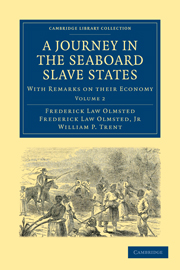CHAPTER III - EXPERIMENTAL POLITICAL ECONOMY OF SOUTH CAROLINA AND GEORGIA
Published online by Cambridge University Press: 29 August 2010
Summary
“Ill fares the land, to hastening ills a prey,
Where wealth accumulates and men decay.”
The Deserted Village.“Laws grind the poor, and rich men guide the law.”
–The Traveller.“Laws, to be just, must give a reciprocation of right; without this, they are mere arbitrary rules.”
–Jefferson.“It is plain that a party so confided in as even a common plowman must be, ought not to have his sense of responsibility blunted.”
–Blackwood.“But, gentlemen, there are two kinds of labor; intelligent and unintelligent labor: the former is that which gives character to a nation, and in giving character gives wealth and power. Hence, I say, encourage the education of all the people, for by so doing you will promote the elevation of character, and give that dignity to the founders of wealth, which is justly their due.”
–Abbott Lawrence.Aristocracy, or an established superior class, necessitates inferiority, or a subject class, at whose expense, in some way, the aristocracy is supported. In a rude society, aristocracy may be an economical institution, inasmuch as by the same means that it has power to rule the people, it is able also to defend their commonwealth. The ruder, the more barbarous, and the more villainous the state of society, the more easily will aristocratic government be supported by the people, as being less expensive than a constant liability to more improvident and unsystematized plundering of the results of labor.
- Type
- Chapter
- Information
- A Journey in the Seaboard Slave StatesWith Remarks on their Economy, pp. 124 - 187Publisher: Cambridge University PressPrint publication year: 2009First published in: 1856

